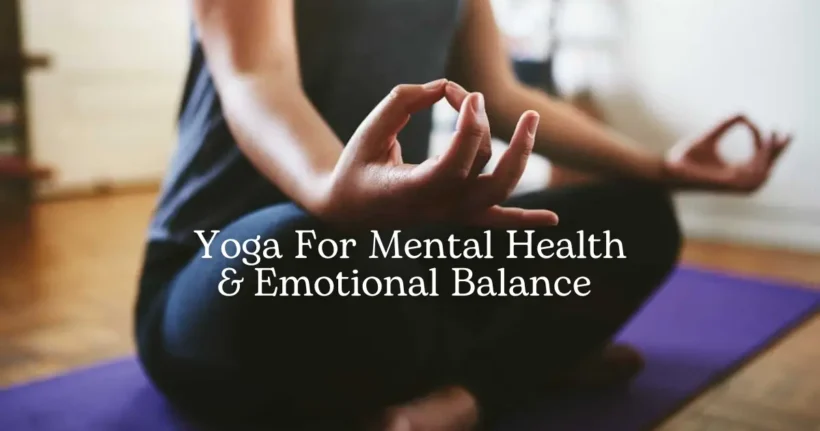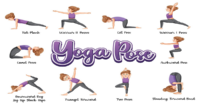In today’s fast-paced world, where stress and emotional turbulence have become the norm, many seek solace in practices that foster inner peace and mental clarity. One such ancient yet highly effective practice is Yoga for Mental Health. Rooted in mindfulness, movement, and breath control, yoga serves as a powerful tool to balance emotions, reduce stress, and enhance overall well-being.
The Connection Between Yoga and Mental Health
Yoga is more than just physical postures, it is a holistic approach to well-being that nurtures the body, mind, and emotions. By integrating controlled breathing, meditation, and movement, yoga cultivates mindfulness, enhances emotional resilience, and fosters a deep sense of inner peace. The connection between Yoga, Mental Health & Emotional Balance lies in its ability to harmonize the nervous system, regulate stress responses, and encourage self-awareness, making it a powerful practice for achieving overall well-being.
How Yoga Benefits Mental Health and Emotional Balance
1. Reduces Stress and Anxiety
One of the most significant benefits of yoga is its ability to lower stress levels. Deep breathing and mindful movements activate the parasympathetic nervous system, which helps counteract the effects of stress. This shift reduces cortisol levels—the primary stress hormone—leading to improved relaxation and emotional stability.
2. Alleviates Symptoms of Depression
Research indicates that practicing yoga stimulates the production of serotonin and dopamine, neurotransmitters known for promoting positive emotions and overall well-being. The combination of physical activity, focused breathing, and meditation creates a natural mood booster, making yoga a beneficial complement to traditional treatments for depression.
3. Enhances Emotional Regulation
Yoga encourages self-awareness and emotional control, helping practitioners navigate negative emotions with greater ease. Through breathwork and meditation, individuals learn to respond rather than react to emotional triggers, fostering a sense of calm and balance in daily life.
4. Improves Sleep Quality
Lack of sleep is often linked to poor mental health. Yoga helps regulate sleep patterns by reducing stress, promoting relaxation, and calming the mind before bedtime. Practices like Yoga Nidra, a guided relaxation technique, have been particularly effective in treating insomnia and restlessness.
5. Boosts Self-Compassion and Self-Esteem
Engaging in regular yoga practice fosters self-acceptance and a positive self-image. Unlike traditional workouts that emphasize external results, yoga encourages an internal journey of self-discovery, promoting self-love and confidence.
The Science Behind Yoga’s Impact on Brain and Emotional Balance
Scientific research highlights yoga’s profound influence on the brain and emotional well-being. Regular practice has been shown to:
- Enhance gray matter density, improving cognitive functions such as memory retention, learning capabilities, and decision-making.
- Strengthen the prefrontal cortex, which plays a crucial role in emotional regulation, impulse control, and resilience against stress.
- Decrease activity in the amygdala, the brain’s fear center, leading to reduced anxiety levels and a calmer response to stressful situations.
- Promote the release of neurotransmitters like serotonin and gamma-aminobutyric acid (GABA), which help stabilize mood and combat depression.
- Improve connectivity between different regions of the brain, fostering emotional balance, self-awareness, and mindfulness.
Yoga Poses for Mental Health and Emotional Balance
Practicing specific yoga postures can significantly enhance emotional well-being. Here are some of the most effective poses for mental health:
1. Child’s Pose (Balasana)
A calming posture that releases tension in the back, shoulders, and neck, promoting relaxation and reducing anxiety.
2. Cat-Cow Pose (Marjaryasana-Bitilasana)
This gentle flow enhances spinal flexibility while linking breath with movement, helping to ease stress and emotional blockages.
3. Standing Forward Bend (Uttanasana)
Encourages blood flow to the brain, relieving symptoms of anxiety and fatigue.
4. Warrior II (Virabhadrasana II)
Promotes inner strength, focus, and confidence, making it an excellent pose for emotional empowerment.
5. Legs Up the Wall (Viparita Karani)
A deeply restorative pose that helps alleviate stress, lower blood pressure, and calm the nervous system.
6. Corpse Pose (Savasana)
The ultimate relaxation pose that integrates the benefits of a yoga session, bringing a sense of deep peace and mindfulness.
Incorporating Yoga into Your Daily Routine
If you’re new to yoga or looking to enhance your mental well-being, here are some simple ways to integrate yoga into your daily life:
1. Start with Short Sessions
Begin with just 10-15 minutes of gentle yoga in the morning or before bed to experience its calming effects.
2. Focus on Breathwork
Breathing exercises like alternate nostril breathing (Nadi Shodhana) and deep belly breathing (Diaphragmatic Breathing) can significantly reduce anxiety and stress.
3. Practice Mindful Meditation
Incorporating meditation into your yoga practice enhances self-awareness and emotional regulation.
4. Join a Yoga Class or Online Session
Whether in-person or virtual, guided yoga classes can provide structure and motivation, helping you stay consistent.
5. Be Consistent
Like any wellness practice, yoga yields the best results when practiced regularly. Even a few minutes each day can make a noticeable difference over time.
Final Thoughts: Embrace Yoga for Mental Health
The practice of Yoga for Mental Health is a transformative journey that fosters resilience, inner peace, and emotional well-being. Whether you’re looking to reduce stress, improve sleep, or cultivate self-awareness, yoga offers a holistic path to achieving mental and emotional balance. By incorporating this ancient practice into your daily life, you can create a foundation for lasting happiness, mindfulness, and well-being.
So, roll out your mat, take a deep breath, and begin your journey towards a healthier mind and a more balanced life.


